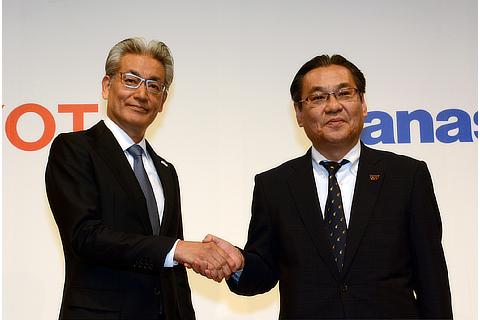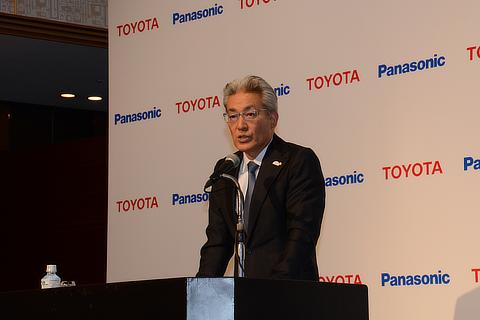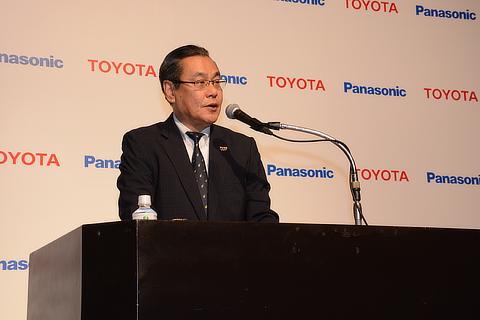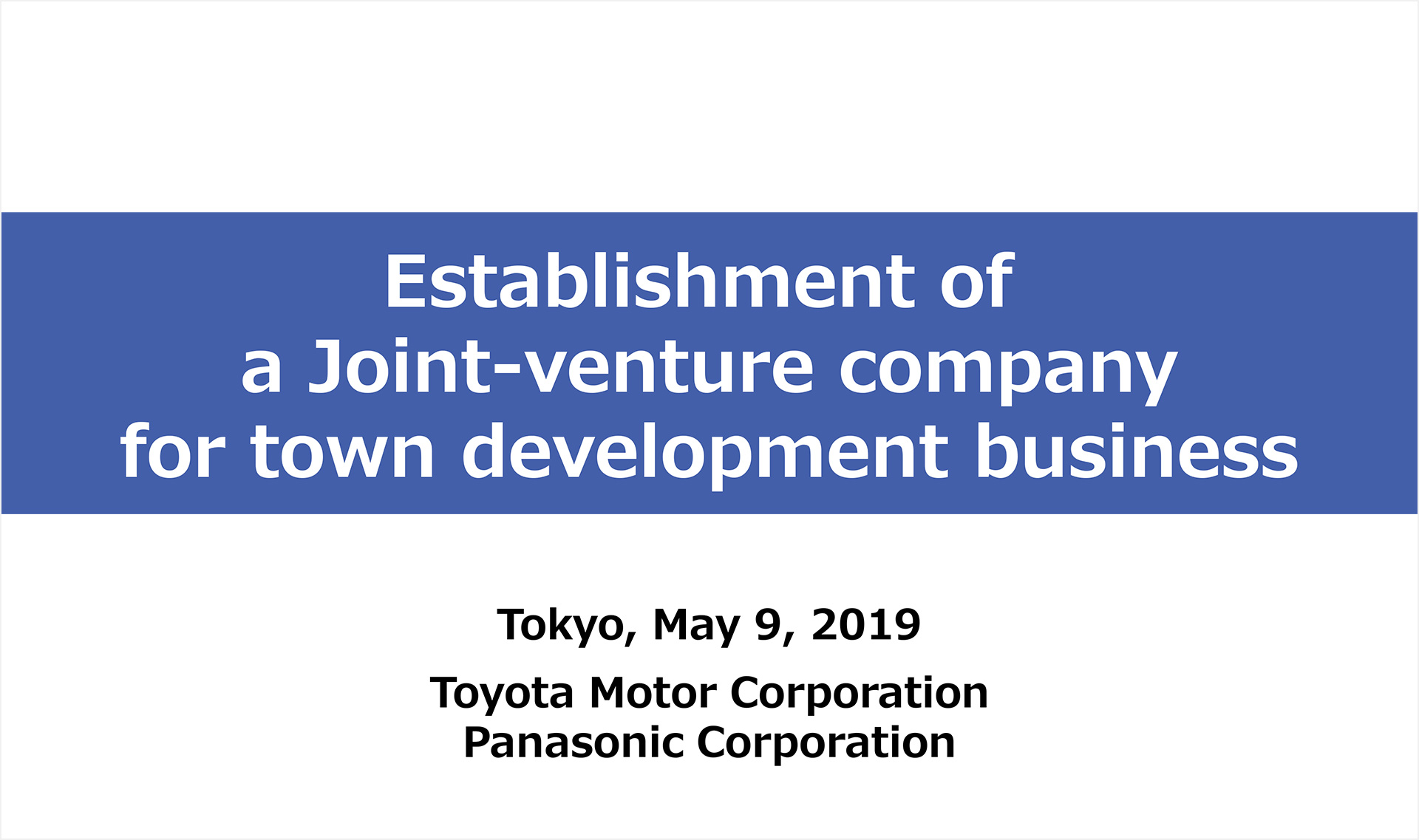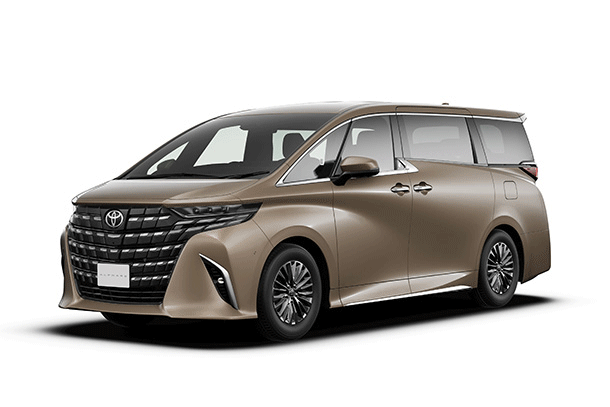May 09, 2019
Panasonic and Toyota Agree to Establish Joint Venture Related to Town Development Business
Toyota Motor Corporation
Toyota City, Aichi/Kadoma City, Osaka, Japan, May 9, 2019―Panasonic Corporation ("Panasonic") and Toyota Motor Corporation ("Toyota") concluded today contracts aimed toward the establishment of a new joint venture ("joint venture") related to the town development business. Both companies aim to fuse the mobility services initiatives promoted by Toyota and the "lifestyle updates" initiatives spearheaded by Panasonic through collaboration based on the establishment of the joint venture, thereby creating new value for the entire town as a whole.
Panasonic and Toyota are committed to realizing improvements in peoples' lives while seeking growth and advancements in the town development business. A rapid change is expected in this business due to the accelerated deployment of IoT*1 technologies in home appliances, household equipment, etc., as well as the evolution in mobility, such as CASE*2 and "MaaS*3," a new concept of providing services by connecting cars, public transportation and other means of transportation through IT.
In the housing business, in which market competition is anticipated to intensify, the two companies will reinforce the foundation of their business through the integration of their respective housing businesses.
Kazuhiro Tsuga, President of Panasonic, said: "In the future, in addition to hardware, the provision of improved services supported by technology will assume a more important role in town development that provides value for customers and the local community. Toyota has been leading the mobility field, and Panasonic has long been serving lifestyle needs of people. We will put our respective strengths together to offer new value in everyday life. Through this collaboration, Panasonic will further challenge itself to continue advancement in the town development business, aiming to deliver the 'ideal lifestyle' for each customer."
Akio Toyoda, President of Toyota, said: "From here on out, information will link all items and services that support people's daily lives thanks to the development of CASE, and considering this from a broad, community-level and society-level perspective that includes cars―in other words, working from the concept of 'connected cities'―will become important. In order to realize this, I believe that it is important to have a spirit of cooperation with friends and allies, while sharing our goals regarding what kind of future we want to create. I want to take on the challenge of providing a new kind of lifestyle, based on the spirit of always wanting to be better and better, while bringing together the strengths of Toyota, with its vehicle business and connected business, and Panasonic, with its home appliance business, battery business, and IoT business, and enhancing our competitiveness, with the housing business of both companies as the core."
In the town development business, Panasonic, together with various companies, has led the development of sustainable smart towns (SST)*4 as advanced models of town development, which drew considerable attention both inside and outside Japan as successful examples of cutting-edge town development. Meanwhile, Toyota has been proceeding with the construction of a "mobility service platform" (MSPF)*5 while enhancing the development of "connected cars," to realize an unrestricted, safe and comfortable mobility society for everyone, and promoting various big data initiatives to benefit both customers and society. In addition, Toyota has also been collaborating with various domestic and overseas companies to create new mobility services. Through the establishment of the joint venture, both companies are committed to contributing to the realization of more attractive towns, making use of Panasonic's knowledge and digital technology related to living, and Toyota's expertise in mobility.
| *1 | "IoT" stands for Internet of Things. Connecting various electronic devices to the internet enables them to communicate and provide technologies and services such as automatic control, remote operation and measuring. |
|---|---|
| *2 | "CASE" stands for Connected, Autonomous, Shared and Electric. |
| *3 | "MaaS" stands for Mobility as a Service, which means a service that realizes seamless transportation for people through the combination of public transportation, rental cars, taxis, rental bicycles and other means. |
| *4 | "Sustainable smart town" means a town that realizes its sustainable evolution in pursuing a better life by adopting state-of-the-art technologies and services. |
| *5 | "Mobility service platform" means the information infrastructure for connected cars constructed by Toyota. |
- Main Points of the Agreement
- The Panasonic group and Toyota will have the same ratio of equity participation in the joint venture. They concluded a memorandum of understanding with Mitsui & Co., Ltd. ("Mitsui") for the creation of new value related to the town development business, and are continuing discussions regarding the development of the joint venture, including the possibility of Mitsui's equity participation. The joint venture is expected to be out of the scope of consolidation for Panasonic and Toyota.
- Panasonic will transfer all of the shares owned by itself or indirectly through its subsidiaries as of today in Panasonic Homes Co., Ltd. ("Panasonic Homes"), Panasonic Construction Engineering Co., Ltd. ("Panasonic Engineering") and Matsumura-gumi Corporation ("Matsumura-gumi") to the joint venture. With respect to Panasonic Engineering, such transfer will take place after a Panasonic subsidiary succeeds to part of Panasonic Engineering's business, such as contracted construction work from housing equipment distributors, through an absorption-type company split. Toyota will make Toyota Housing Corporation ("Toyota Housing") its wholly-owned subsidiary through means such as by causing Toyota Housing to acquire from Toyota group companies and other parties, shares in Toyota Housing, and thereafter transfer all of the shares in Toyota Housing to the joint venture. Panasonic and Toyota will transfer the relevant shares to the joint venture by a joint share transfer ("transaction").
- From Toyota's side, Toyota Housing will acquire approximately 49% of the shares in Misawa Homes Co., Ltd. ("Misawa Homes") which are owned by Misawa Homes' shareholders other than Toyota Housing by conducting a so-called triangular share exchange, and thereby Toyota will ultimately own the shares in Misawa Homes indirectly through Toyota Housing.
- The joint venture will acquire the shares in Misawa Homes from Toyota Housing after the triangular share exchange.
- Background and Purpose of the Establishment of the Joint Venture
With the concepts of a "home" or "town" subject to drastic change due to factors such as changes in customer's values and further advancements in mobility, such as in automated driving, and development of communication technology and other fields, the key element required to make a certain town competitive in the town development business may shift from the "location" of that town to "the degree of satisfaction with the service infrastructure for daily life" in that town.
Furthermore, in the domestic housing market, a decrease in the number of new housing starts due to the current demographic situation is expected to lead to an intensified market competition. Under such circumstances, through establishment of the joint venture, Panasonic and Toyota aim to integrate their respective housing businesses and reinforce the foundation for such housing business in the face of severe market competition. At the same time, Panasonic and Toyota aim to achieve business growth in the field of town development, which is expected to continue to grow in the future, by making use of the strengths of both companies in the field.
Through the integration of the housing businesses of Panasonic Homes, Toyota Housing and Misawa Homes, Panasonic and Toyota will ensure a top-class position in the domestic housing industry with a supply of approximately 17,000 detached houses. Both companies will endeavor to reinforce the management structure and further improve profitability through expanding the scale of the business.
The joint venture will set the same ownership ratio between Panasonic group and Toyota in order to secure its autonomous management while continuing to receive support from both shareholders. Although the joint venture is expected to be out of the scope of consolidation for Panasonic and Toyota, growth and development of the town development business through the combination of the real estate business with technology continues to be an important focus in the business strategies of both Panasonic and Toyota. The joint venture company will further strengthen its foundation in the housing business through the integration of the housing businesses of both companies, and establish a structure which enables dynamic expansion of the town development business, which will be the core of its future growth.
- Outline of the Joint Venture
|
Prime Life Technologies Corporation |
|---|---|
|
Tokyo |
|
Makoto Kitano, Representative Director and President |
|
Town development, contracted new housing construction, home remodeling, real estate transaction/management, housing interior decoration, energy-saving solutions, renovation, contracted building construction, construction consulting, etc. |
|
To be determined |
|
January 7, 2020 (scheduled) |
|
Equal ownership ratio between Panasonic group and Toyota |
- Outline of the Subject Subsidiaries
|
Panasonic Homes Co., Ltd. |
|---|---|
|
1-4, Shinsenri-nishimachi 1-chome, Toyonaka, Osaka, Japan |
|
Ryuji Matsushita, Representative Director, President |
|
Contracted new housing construction, town development, home remodeling, real estate transaction/management, etc. |
|
28,375 million yen |
|
July 1, 1963 |
|
Panasonic: 100% |
|
Panasonic Construction Engineering Co., Ltd.*6 |
|---|---|
|
10th floor, Shinagawa Building, 10-27, Higashi-shinagawa 4-chome, Shinagawa-ku, Tokyo, Japan |
|
Shuichi Matono, Representative Director and President |
|
Interior decoration, energy-saving solutions, renovation, etc. |
|
400 million yen |
|
September 1, 1989 |
|
Panasonic: 100% (including equity owned indirectly) |
| *6 | Panasonic Eco Solutions Construction Engineering Co., Ltd. was renamed Panasonic Construction Engineering Co., Ltd. on April 1, 2019. |
|---|
|
Matsumura-gumi Corporation |
|---|---|
|
3-21, Tenma 1-chome, Kita-ku, Osaka, Japan |
|
Yasuharu Iwamoto, Representative Director and President |
|
Contracted construction services, construction consulting, etc. |
|
500 million yen |
|
July 15, 1919 |
|
Panasonic: 100% (including equity owned indirectly) |
|
Toyota Housing Corporation |
|---|---|
|
23-22 Izumi 1-chome, Higashi-ku, Nagoya City, Aichi, Japan |
|
Tadashi Yamashina, President |
|
Design, manufacture, and sale, etc. of construction components and housing-related equipment, planning, design, supervision, construction work, and subcontracting for land development and town development, etc., sale and lease, etc. of real estate. |
|
12,902 million yen |
|
April 1, 2003 |
|
Toyota: 89.25%, Toyota group companies and others: 10.75% |
|
Misawa Homes Co., Ltd. |
|---|---|
|
4-1 Nishi-Shinjuku 2-chome, Shinjuku-ku, Tokyo, Japan |
|
Masashi Isogai, President and CEO |
|
|
|
11,892 million yen |
|
August 1, 2003 |
|
Toyota Housing: 51% |
- Outline of Transaction Structure
- Schedule of the Transaction
| Execution of the business-integration contract and the joint venture contract | May 9, 2019 (today) |
|---|---|
| Date on which the establishment of the joint venture will be registered (the date on which the share transfer comes into effect) | January 7, 2020 (scheduled) |
- Note
- The execution of the transaction is subject to, among other things, obtaining any permissions and approvals from the relevant authorities in the relevant countries required under competition laws and any other permissions and approvals necessary for the execution of the transaction. In addition, the above schedule may be changed through mutual consultation between Panasonic and Toyota, if required due to the progress of the procedures for the execution of the transaction or for other reasons.
Toyota may file a registration statement on Form F-4 ("Form F-4") with the U.S. Securities and Exchange Commission (the "SEC") in connection with the share exchange that is expected to be conducted with Toyota Housing and Misawa Homes as part of the integration of the housing businesses of Panasonic and Toyota (the "Share Exchange"). The Form F-4 (if filed) will contain a prospectus and other documents. If a Form F-4 is filed and declared effective, the prospectus contained in the Form F-4 will be mailed to U.S. shareholders of Misawa Homes prior to the shareholders' meeting of Misawa Homes at which the Share Exchange will be voted upon. The Form F-4 and prospectus (if a Form F-4 is filed) will contain important information about Toyota, Toyota Housing and Misawa Homes, the Share Exchange and related matters. U.S. shareholders to whom the prospectus is distributed are urged to read the Form F-4, the prospectus and other documents that may be filed with the SEC in connection with the Share Exchange carefully before they make any decision at the shareholders' meeting with respect to the Share Exchange. Any documents filed with the SEC in connection with the Share Exchange will be made available when filed, free of charge, on the SEC's web site at www.sec.gov. In addition, upon request, the documents can be distributed for free of charge. To make a request, please refer to the contact below.
Masayoshi Hachisuka
Toyota Motor Corporation
1 Toyota-cho, Toyota City Aichi, 471-8571 Japan
- Telephone
- +81-565-23-2005

